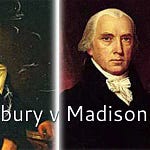This Day in Legal History: MLK Assassinated
On this day in legal history, April 4, 1968, the civil rights movement faced a tragic moment when Martin Luther King Jr., an emblematic leader advocating for nonviolent resistance against racial discrimination, was assassinated in Memphis, Tennessee. King's untimely death occurred at the Lorraine Motel, a location that has since been etched into the national consciousness as a site of profound loss and reflection. His assassination sparked an outpouring of grief and anger across the United States, leading to widespread riots in over 100 cities and a national mourning that underscored the deep divisions and tumultuous struggles of the era.
In the immediate aftermath, James Earl Ray, a fugitive from the Missouri State Penitentiary, was identified and later apprehended at London's Heathrow Airport, marking the beginning of a controversial and complex legal saga. Ray was charged with King's murder, and in a move that avoided a potentially explosive trial, he entered a guilty plea, receiving a 99-year prison sentence. However, Ray recanted his confession three days later, claiming he was a pawn in a broader conspiracy, a declaration that fueled ongoing debates and investigations into the assassination.
The legal reverberations of King's assassination extended beyond the pursuit and conviction of his killer. In response to the national tragedy, Congress was galvanized to enact further civil rights legislation, including the Fair Housing Act of 1968, which sought to eliminate housing discrimination against minorities, a cause King had fervently championed. Moreover, the assassination intensified efforts to ensure equal rights and justice, inspiring legal challenges and reforms that continued to shape the civil rights landscape.
King's legacy, deeply rooted in his pursuit of justice and equality through peaceful means, has had a lasting impact on American legal and social fabric. His vision and teachings continue to inform contemporary movements and legal principles, demonstrating the enduring power of nonviolent resistance in the face of injustice. On this day, we remember not just the loss of Martin Luther King Jr. but the enduring influence of his life's work on the quest for civil rights and legal equality in America.
Sanofi has agreed to settle approximately 4,000 lawsuits in the United States alleging that the heartburn medication Zantac, which the company previously marketed, is linked to cancer. This agreement aims to resolve most of the legal actions against Sanofi in U.S. state courts, except for those in Delaware, where the bulk of cases are still pending. Despite not admitting liability, Sanofi cited the desire to avoid the costs and distractions of ongoing litigation as reasons for the settlement, the financial terms of which were not disclosed.
The company still faces around 20,000 additional lawsuits in Delaware, with both sides awaiting a crucial judicial decision on the scientific validity of the claims that Zantac causes cancer. This situation follows a 2022 victory for the drugmakers when a judge dismissed 50,000 similar lawsuits on the grounds that the plaintiffs' expert opinions lacked solid scientific support. Amidst ongoing litigation, Sanofi has introduced Zantac360, a reformulated version of the medicine, following the discovery of NDMA, a carcinogenic chemical, in some Zantac pills which led to its market withdrawal in 2020 by the FDA's request.
Sanofi to settle 4,000 Zantac cancer lawsuits in US state courts | Reuters
A New York judge has rejected former U.S. President Donald Trump's request to delay his upcoming trial over charges related to hush money payments until after the U.S. Supreme Court reviews a separate case regarding presidential immunity. The trial, set for April 15, involves allegations of falsifying business records to conceal a payment made to silence claims of a past sexual encounter ahead of the 2016 election, an encounter Trump denies. Trump's legal team had argued for the delay, citing the relevance of a Supreme Court case set for April 25 that will consider Trump's immunity claims related to actions taken during his presidency. However, Justice Juan Merchan dismissed the delay request, noting Trump's late invocation of presidential immunity as a defense.
This trial in New York could potentially be the only one of four criminal indictments against Trump to proceed before the November election, where Trump is a Republican candidate. Additionally, Trump's lawyers have sought to postpone the trial due to concerns over prejudicial pre-trial publicity, though the court has not yet ruled on this matter. The Manhattan District Attorney's office has opposed the delay, arguing that unbiased jurors can be selected despite the extensive media coverage, much of which, they claim, Trump instigated. The decision by the Supreme Court to hear Trump's appeal in a federal case has already delayed that trial, highlighting the unprecedented nature of a former U.S. president facing criminal proceedings.
Trump loses bid to delay hush money trial until US Supreme Court review | Reuters
The Massachusetts Supreme Judicial Court is considering class action lawsuits against the collection of website users' browsing data without consent, a practice allegedly involving tools from Meta Platforms and Google. This consideration interprets a 1960s eavesdropping prohibition, originally intended for phone and telegraph communications, as applicable to modern internet tracking. The court is deliberating on whether to allow two proposed class actions to proceed, which accuse two hospitals of violating the Massachusetts Wiretap Act by using third-party technologies that share users' activities with companies like Google and Meta. The possibility of making any ruling prospective was suggested by justices, to avoid penalizing past tracking activities not previously identified as illegal under the law.
The case arises from complaints by Kathleen Vita, who alleges that her visits to the Beth Israel Deaconess Medical Center and New England Baptist Hospital websites resulted in the unauthorized sharing of her browsing data. A trial court judge previously determined that the wiretap law does cover such internet tracking, a decision challenged by the hospitals' legal representation as an "absurd" extension of the decades-old statute. However, the Supreme Court's prior extension of the law's coverage to cell phones and text messages in 2013 supports the argument for its applicability to internet data collection.
The lawsuit has drawn attention from industry groups like the U.S. Chamber of Commerce and National Retail Federation, concerned about the implications for countless website operators using common analytics tools. Despite similar cases being dismissed in other states, the Massachusetts case, bolstered by a prior $18.4 million settlement in a similar lawsuit, could set a precedent. The defense argues that the use of such data-gathering technologies falls under a business exemption, a claim met with skepticism from the court regarding its relevance to hospital operations. The court's final decision may include prospective measures to allow website operators to adjust practices accordingly, highlighting the case's potential surprise and impact on the broader web development and ownership community.
Massachusetts top court considers allowing website tracking class actions | Reuters
The estate of the late comedian George Carlin settled a lawsuit against podcasters Will Sasso and Chad Kultgen, who used AI to create a faux Carlin comedy special and release it on YouTube. As part of the agreement, the podcasters from "Dudesy" will remove the AI-generated content and are barred from using Carlin's image, voice, or likeness without permission. This legal battle highlights the challenges at the intersection of AI technology, copyright law, and post-mortem publicity rights, marking one of the first cases to address these issues head-on.
The lawsuit, filed by Carlin’s estate in the US District Court for the Central District of California, underscores the growing concerns over the misuse of AI to replicate individuals' likenesses. Kelly Carlin, George Carlin’s daughter, expressed hope that this case would serve as a cautionary tale about the potential dangers of AI and the importance of establishing protective measures. The settlement, though largely confidential, is seen as a necessary step in addressing the legal implications of advancing AI technologies in the realm of intellectual property and personal rights.
George Carlin Estate Settles AI-Made Comedy Special Lawsuit (1)













